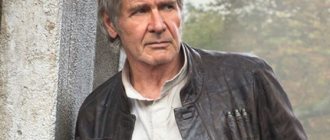Miyako was practicing aikido herself when Seagal met her. Steven Seagal inherited the status of her father, the head of a famous dojo in Osaka. Actually, evil tongues claim that for Seagal this was a marriage of convenience, since despite all his achievements, he would not have been able to achieve such a position in Japan without entering the Japanese family. The dojo building that he began to manage, by the way, belonged to Miyako’s mother. And his separation from Miyako was, they say, not the most ethical. Having started his Hollywood career, he went to a Hollywood actress and married her, without disclosing the presence of his first wife. Fujitani had to annul her marriage to Seagal herself. As you understand, this is all at the level of rumors. Seagal himself spreads rather confusing information about himself, and Fujitani's book, which contains his version, has not been translated. Now Miyako is a sensei herself in Osaka, she has the 7th dan of Aikido, she has been teaching for more than 45 years, and, as they say, she received her first dan from Morihei Ueshiba, the founder of Aikido. Her son Kentaro Seagal, 4th Dan in Aikido, runs the US branch of her dojo. Daughter, Ayako Fujitani, is an actress and writer, quite famous. Among other things, for example, she starred in Gamera 3 (Gamera is a popular Japanese monster, like Godzilla, but not a lizard, but a turtle).
Aikido Today Magazine
No. 67; Vol. 14, No.1; January/February '00
Author: Cody Lewallen (5th dan, head of the Arizona Tenshin dojo branch).
Cody: Sensei, why did you start practicing Aikido? Fujitani: When I was young, I lived in Kobe. And every day on the train I was pestered by nasty old men, you know, the ones who like to grope women. I studied a lot in the evenings, for example, I studied ballet, and when I went home, it was already dark, and every time on the train I came across some old guy like that. I was terribly afraid. So I started studying Aikido. I hated men back then. Now I like them (winks). I was weak-willed and very feminine, so I couldn’t get rid of them. Cody: What do you think about women in Aikido? Fujitani: When I first started, I had the feeling that only men were practicing around me. It deprived me of spirit. I tried not to think about it. Men and women are different. Men have more muscles and are stronger. But the more muscles you use, the slower you will learn the technique properly, and the faster you will forget it. For women in Aikido in particular, it is important to know when and how to use force. It's important not to rely on it.
After a year of training, my technique was terrible. I tried to compete with stronger men, I fought and fought, refusing to appear weak. I tried my best to complete the movement and appear strong. In the process, I broke almost all my bones: arms, wrists, knees, even fingers. Finally, I had to take a break for six months. The attitude “there are only men in Aikido” was completely killing me.
When people fight and use all their strength, they forget that Aikido is not about fighting. So they are not doing Aikido. By pushing through the technique, trying to appear strong, you forget about the quality of the technique and do not show respect to your partner. (Techniques in Aikido are learned mainly in pairs. One attacks, the other defends. When talking about learning a technique, we are talking about who is defending from an attack. Because of this, it is sometimes believed that it is desirable to be in the role as often as possible defender, and the role of the attacker seems auxiliary). Respect for your partner is the key to good technique, but it is very difficult to cultivate. People who believe that in Aikido you have to use all your strength and try to look as powerful as possible should take up running or lifting weights or just go and do ukemi alone. (Uke is the one who attacks, and then insures himself by falling when his partner performs a technique. A very ridiculous task to do alone). Cody: At least if they do ukemi alone, they'll understand how their partners feel! Fujitani: It's vitally important to take care of your partner. That’s why in my dojo the role of ukemi goes to everyone, even the main instructor. In some dojos, senseis do not do ukemi. They just stand there and show everyone what cool “teachers” they are. They are like those who give advice to the driver in a car. Perhaps it would have been even better without!
Of course, if the instructor is already an elderly person, it is understandable that he does not want to be thrown to the ground. But it happens to see instructors of about 20 years old who walk around and throw people around as if they were the masters here. Perhaps the owners too. But it's not right.
Once on the Internet I saw such an overweight instructor that if he fell to the floor, he would die! I don't want to say that all fat instructors don't have the technique, but if you can't work ukemi and take care of your partner, then something is wrong.
I don't consider myself the coolest woman on the planet, but I'm trained. I hope to practice and teach until the day I die. I want to constantly grow.
Everyone thinks Steve (Segal) is so powerful because he's so tall. It is not true. He is also well trained. O-Sensei was short. Imagine how luxurious he would be if he were also as tall as Steve?
Sometimes short people can't replicate some of Steve's techniques. Try kneeling as if you were a short person and do a Steve-style sankyo. You will open yourself up to a knee to the ribs. So I do sankyo differently. It doesn't matter. After all, people don't pay me to take classes because I'm Steve's ex! (laughs)
(Sankyo is the third classical technique in Aikido, I found a picture of O-Sensei himself). Cody: Speaking of Sensei Seagal, how did you meet him? Fujitani: We met at the Los Angeles airport. It was in July 1974, there was an Aikido seminar. A large group of students were waiting at the airport for Sensei Koichi Tohei, who was flying from Japan. When I met Steve, he had long hair and was very tall and thin. (Giggles) I couldn't stand skinny guys with long hair. I was scared: he looked like a Japanese ghost! And he was wearing one of these Hawaiian shirts, all so bright, can you imagine?
Later, when I got to know him better, I noticed that he had beautiful eyes and that he spoke softly and kindly.
He said that he was going to Japan. He received money from an insurance company after he injured his leg while doing karate. After the seminar, I went to the dojo where he studied. I watched him take the shodan exam (I had nidan at the time). (Shodan - 1st dan, Nidan - 2nd dan, that is, she passed further). The exam was taken by Koichi Tohei. (Student of Morihei Ueshiba and founder of his own style of Ki-Aikido). Cody: How was Sensei Seagal accepted as an instructor in Japan? Fujitani: Oh, that was big news. He became the first foreigner to head the dojo. Reporters from TV and newspapers came, and after their reports we had more students than we could accommodate. Cody: Sensei Seagal already belonged to Omota-kyo at this time? (Omote-kyo or Oomoto is a Japanese religion, ritually similar to Shintoism, which was professed by the founder of Aikido). Fujitani: Steve said he wanted the Oomoto people to hold the opening ceremony at the dojo. My family did not belong to Oomoto. We were introduced to him by a “friend of a friend”—an American who lived in Japan. After meeting Omote-kyo, we received the name "Tenshin" from the then head of Oomoto. He also made the calligraphic inscription "Tenshin", which hangs in front of the dojo next to the portrait of O-Sensei. I remember asking Steve how his family felt about him changing religion, and he said it wasn't a problem. I asked him again because it seemed to me that changing religion was serious, and he again answered “no problem, don’t worry.” He said that he read a book about Omote-kyo in America and believed in it. Cody: How did you cope when he left? Fujitani: First, one of the uchi-deshi took over the class. I had to kick this man out because he was lying and causing a lot of problems. He lied to the students and tried to turn them against me. I had to train a new uchi-deshi. I chose a man who was much lower level and younger than most of the older students, but I saw that he was striving to develop. And I knew that he could handle it. (Uchi-deshi is a student living in the teacher’s house, usually doing housekeeping in the dojo, helping the sensei). Cody: Did Seagal Sensei help you when he left? Fujitani: Well, he left gradually. First he went to America and worked at a local dojo. Then he acted in films. But when he decided to leave, he left completely. When he left and I chose a new uchi-deshi, the students left too. I had to start over. It was very hard... Sometimes I would come to class and there would only be one person there. Besides, I had to take care of the children. I don't know how we managed. Sometimes we only had cheap brown rice for dinner. Cody: What helped you? Fujitani: I think what helped me through difficult times was the love of my children. The children grew up, went into show business, and somehow I got to the top. The second reason is the success of my students. If I didn't have such good, loyal students, I wouldn't have achieved what I have. Cody: I've heard rumors about the mafia and other problems. Could you talk about this? Fujitani: You can read about it in my book! By the way, if someone in your magazine knows how I could publish it in English, please write me an e-mail. Cody: Let's talk about your book? What's in it? Fujitani: In it I wrote about my experience, about the basics of Aikido, partly in the form of essays, partly in the form of poems. Cody: Experience? Fujitani: For example, about how I met Steve, about our divorce, about how we lost a child, about how I raised two children, about their careers and film debuts and about some of the most important moments in Aikido. Cody: I would definitely love to get your book. There is one more question left: ki. Fujitani: If you use all your strength and power, as we said at the beginning, you do not understand ki. To understand ki, it is very important to feel. Cody: Feel what? Fujitani: Whatever. For example, if someone smiles and acts nice to you, you need to know if this person is sincere. Or if someone attacks you with a knife, don't just focus on the knife. This way you won't feel the attack speed. You need to look at the attacker's entire body, feel his movement, intent and ki.
You must flow like water. Water always flows downwards, it does not fight against instincts. If you always use force in Aikido, you will not be sensitive enough. Water does not flow upward, and it is also unnatural for us to train at the risk of our lives, demonstrating maximum strength and machismo. By training this way you will not learn to feel.
You are walking down the street and someone pushes you. If you think “I am strong,” then you push him back even more harshly, and the one who is stronger wins. But they both have shoulder pain. Flow like water, turn like an opening door. This is "tenkan". (Tenkan is a turn, an evasive beginning, an attentive passivity). Don't fight your partner's ki, feel it.
Source ttp://shoubudojo.com/miyako-fujitani/
Related materials:
- A black belt is a white belt that never gives up
- 47th Aikido intensive in Stavropol. Not thanks, but in spite of
- Aikido intensive in Stavropol
- Aikido intensive for children in Stavropol
- Oriental rehabilitation massage in Stavropol
Latest materials:
- Master of Daito-ryu Aikijujutsu about judo.
Old materials:
- Tetsutaka Sugawara Martial arts throughout life.
- Dictionary of martial arts terms.
Next page >>
Aikido Tenshin Dojo Russia, Sensei Miyako Fujitani 7th dan Shihan
On September 27-29, a seminar was held in Moscow by Sensei Miyako Fujitani, 7th dan Aikido Aikikai.
The Maxanto correspondent was lucky enough to receive parting words at the seminar from the head of the Aikikai Osaka Tenshin dojo, Miyako Fujitani.
“The whole meaning of Aikido cannot be conveyed in words, beautiful expressions or actions.
“Aikido can only be understood through constant training.
— Through the path from heart to heart. Through Satori.
- Remember this and train every day.
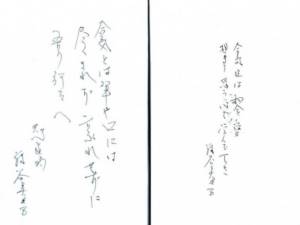
*author of the translation Marina Shchepetunina
*Satori - in the meditative practice of Zen - the internal personal experience of understanding the true nature (of a person) through achieving the “state of one thought” (Sanskrit dhyana or Japanese Zen)
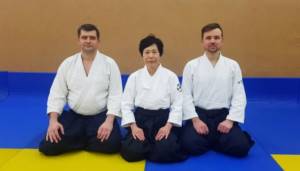
At 72 years old, the head of the Aikikai Osaka Tenshin dojo, Miyako Fujitani, looks simply stunning.
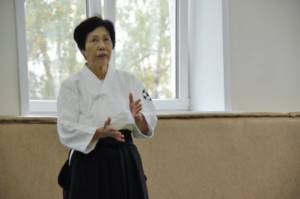
A lot of sparkling humor, techniques used in real situations, top belay from the master, all this could not help but energize all the aikidokas present.
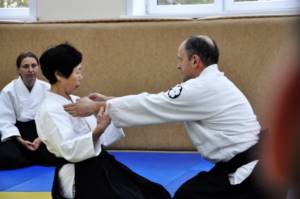
Sensei Miyako has been teaching Aikido in Osaka for over 45 years. (https://aitenshin.com/), Miyako Fujitani received her first dan from Morihei Ueshiba, the founder of Aikido.
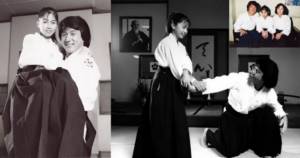
Her son Kentaro Seagal, 4th Dan in Aikido, runs the US branch of her dojo. Daughter, Ayako Fujitani, is an actress and writer.
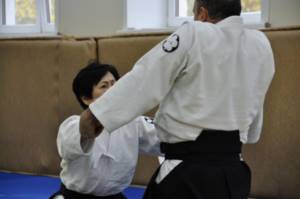
In one of the interviews, Sensei was asked about Ki.
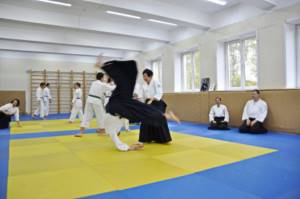
— Fujitani: If you use all your strength and power, as we said at the beginning, you do not understand ki. To understand ki, it is very important to feel.
— Cody: Feel what?
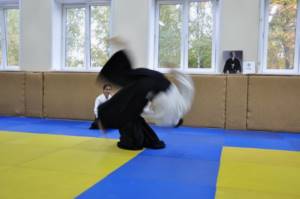
— Fujitani: Whatever. For example, if someone smiles and acts nice to you, you need to know if this person is sincere. Or if someone attacks you with a knife, don't just focus on the knife. This way you won't feel the attack speed. You need to look at the attacker's entire body, feel his movement, intent and ki. You must flow like water. Water always flows downwards, it does not fight against instincts. If you always use force in Aikido, you will not be sensitive enough. Water does not flow upward, and it is also unnatural for us to train at the risk of our lives, demonstrating maximum strength and machismo. By training this way you will not learn to feel.
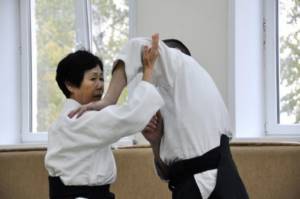
You are walking down the street and someone pushes you. If you think “I am strong,” then you push him back even more harshly, and the one who is stronger wins. But they both have shoulder pain. Flow like water, turn like an opening door. This is "tenkan".
*Tenkan is a turn, an evasive beginning, an attentive passivity). Don't fight your partner's ki, feel it.
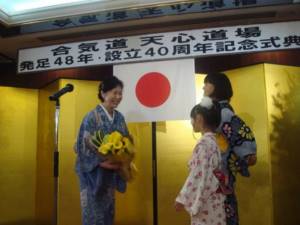
For reference: Miyako Fujitami is the ex-wife of the famous actor and Aikido Master Steven Seagal.
Fujitami Sensei heads the Tenshin Dojo in Osaka. She received her first “black belt” from O-Sensei Morihei Ueshiba.











